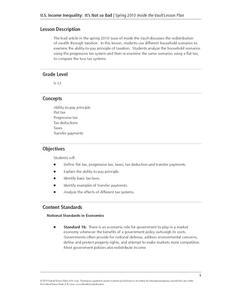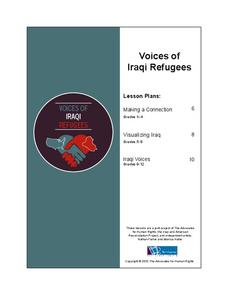iCivics
Why Do We Have a House and Senate, Anyway?
Why does the United States have a bicameral voting system? Through role playing as either advocates for or against a cell phone policy in school, your learners will organize, vote, compromise, and experience first-hand the benefits of a...
Center for Civic Education
The Power of Nonviolence: Change Through Strategic Nonviolent Action
How did major historical figures, such as Henry David Thoreau, Susan B. Anthony, and Mohandas K. Gandhi, explain and defend their beliefs in nonviolence? Your learners will begin by studying the backgrounds of these individuals, and then...
Carolina K-12
Learning About the Federal Budget: “Get a Pencil, You’re Tackling the Deficit!”
Your class members have been selected by the president to help solve the budget crisis as part of a special deficit commission. After learning about fiscal policy, economic theories, and the federal budget through a detailed PowerPoint...
Carolina K-12
The Cuban Missile Crisis
This is the perfect introduction to the Cuban Missile Crisis for your young learners. The lesson includes an engaging mock air raid, in-depth discussions, audio of President Kennedy's speech to the nation, and an event overview.
Speak Truth to Power
Marina Pisklakova: Domestic Violence
After reading Article 3 of the Universal Declaration of Human Rights and discussing background material about domestic violence, class members create a map showing where in their community survivors of domestic violence can get help and...
Carolina K-12
Introduction to the Holocaust
Young historians gain a well-rounded insight into the tragedy of the Holocaust by exploring pre-war Jewish life, reading and discussing survivor testimonies, and illustrating their understanding by using their own words and those of a...
Federal Reserve Bank
U.S. Income Inequality: It's Not So Bad
What is the difference between a flat tax, progressive tax, tax deduction and transfer payments? Pupils examine the ability-to-pay principle of taxation through discussion, problem solving, and a variety of worksheets on topics from US...
Federal Reserve Bank
Worth!
Before loaning a friend money, what factors would you consider and why would you lend it? Your young economists will face questions like these in a lesson on banking, profit, risk, and reward, which includes the reading of the book...
Carolina K-12
Marsh v. Chambers and the Establishment Clause
1983 Supreme Court case Marsh v. Chambers, which centers on whether opening a legislative session with a prayer violates the Establishment Clause in the First Amendment to the US Constitution, is the focus of a series of discussions and...
University of North Carolina
Congress and the Legislative Process: A Simulation in How a Bill Becomes a Law
As part of the study of the legislative process, scholars research redistricting and gerrymandering and the effects of these activities on lawmaking. On day one of the two-day plans, individuals redistrict the state of Elbonia so that...
Visa
Keeping Score: Why Credit Matters
How does one get credit, and who provides credit? What is a credit score, and how can an understanding of a credit score help you to make smart financial decisions? Through discussion and worksheets, class members will identify the...
Center for Civic Education
Becoming a Voter
What are the requirements to register to vote in the United States? Young citizens evaluate this process by working with handouts, informational texts, discussion, and research, as well as complete a sample voter registration form.
Historical Thinking Matters
Rosa Parks: 3 Day Lesson
How can evidence and perspective challenge even the most well-known of stories? Through primary and secondary source analysis, think-alouds, and discussion, young historians evaluate the historical narrative of Rosa Parks across multiple...
Carolina K-12
Advocacy 101
Want a change? Become an advocate. As part of a study of the responsibilities of good citizens, class members engage in a series of role plays that model how to lobby for change.
School Improvement in Maryland
Evaluating Political Advertisements
How do interest groups try to influence elections? As part of their study of the election process, groups view 30-second advertisements produced by advocacy groups and use the provided worksheet to evaluate these ads. They then craft...
John F. Kennedy Presidential Library & Museum
Military Advisers in Vietnam: 1963
How did the beginning of the Vietnam War factor into the Cold War with the Soviet Union? As part of a study of American involvement in Vietnam, class members read a letter address to President Kennedy and his response in which he...
Classroom Law Project
Should we believe everything we read? Becoming a discerning consumer of media
Class members investigate the role media should play in a healthy democracy. As part of this study, groups analyze political advertising, use FactCheck to assess not only the veracity of but the persuasions techniques used in candidates'...
Classroom Law Project
What does the Constitution say about voting? Constitutional Amendments and the Electoral College
As part of a study of voting rights in the US, class members examine Constitutional amendments connected with voting and the role of the Electoral College in the election process.
Global Oneness Project
Architectural Wonders
Angkor Wat, a UNESCO World Heritage Site located in Cambodia, is the focus of a lesson that asks class members to consider factors that could result in the destruction of these archeological treasures. Pupils listen to a lecture on the...
Advocates for Human Rights
Voices of Iraqi Refugees
The stated goal of this resource is to provide learners with basic facts about and build empathy for Iraqi refugees. To do so elementary classes develop a plan for how to welcome refugees to their classroom. Middle schoolers read...
National WWII Museum
“My Dear Little Boys…” Interpreting a letter home from the war
Letters have long been prized by historians as primary sources for what they reveal not only about events but also about the emotional responses of the writers to these events. "My Dear Little Boys," a letter written by Leonard Isacks on...
Teaching Tolerance
Changing Demographics: What Can We Do to Promote Respect?
America has always been seen as a melting pot to the world. Scholars research the concept of blending cultures in the United States and how it is changing over time. The final lesson of a four-part series analyzes the changing...
Library of Virginia
An Overview of American Slavery
The final lesson in a unit study of American slavery asks young historians to synthesize what they have learned about how slavery in America changed over time. Revisiting the many documents they have examined, they consider the economic,...
Library of Virginia
Emancipation and the Thirteenth Amendment
Why didn't the Emancipation Proclamation free all slaves? Young historians study primary source documents including Lincoln's proclamation and the 13th Amendment to the United States Constitution. Groups also investigate the three...
Other popular searches
- Social Skills Lesson Plans
- Autism Social Skills
- Personal Space Social Skills
- Social Skills for Teens
- Current Events Social Skills
- Social Skills Adolescents
- Social Skills Lessons
- Social Skills Games
- Team Building Social Skills
- Circle Time Social Skills
- Teaching Social Skills
- Cooperation Social Skills

























